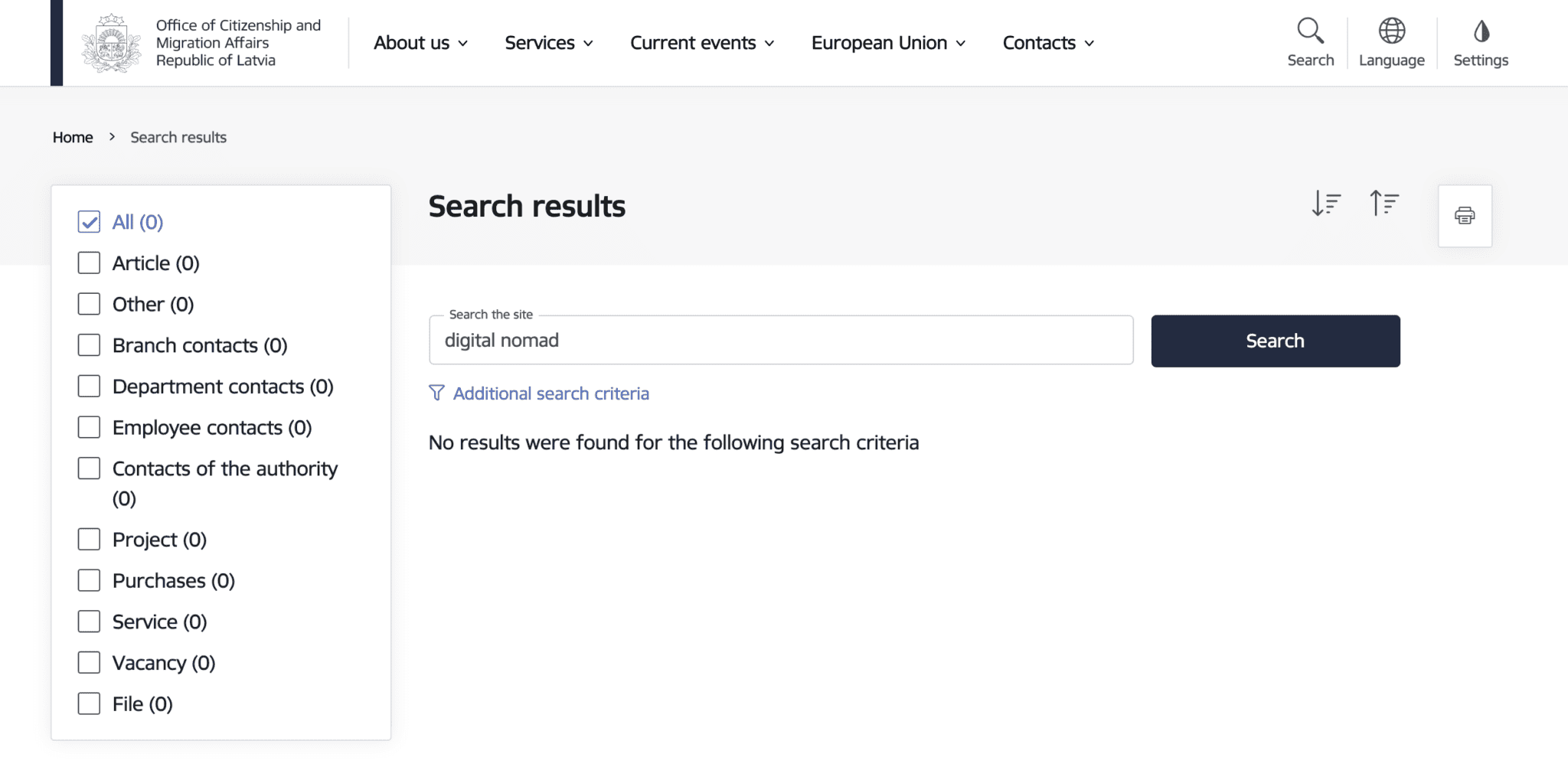Sign up for our Newsletter
Receive the latest updates on Latvia’s business environment, economic developments, and investment opportunities.
30.05.2023 - Support
Digital nomads – the knowledge workers who, instead of having a home, travel the world while working from their computers. As this trend picked up, one big issue became clear – where do these high earners declare their taxes, and what sort of permit do they travel on? Countries quickly became wise to the benefits of being the chosen tax home for digital nomads, and nations’ digital nomad visas started springing up left, right, and center. Latvia was no exception, joining countries like Estonia, Croatia, Barbados, and many more.
Now that a full year has passed with the digital nomad visa in place, we decided to take a look at how it’s going. Has it delivered all we expected?
First off – what are digital nomads? The digital nomad visa says that they are third-party nationals (meaning, neither Latvian nor EU nationals), who are employed by a foreign employer or are self-employed.
Digital nomads are usually top earners, and thus, top spenders wherever they end up, making them an enticing demographic for countries to draw in.
When Latvia announced it would be launching its own digital nomad visa, it was met with overall support. It was a sign that our politicians were keeping up with the trends, and doing what’s possible to make our country attractive to skilled, and high-earning professionals. We had a lot that could be benefited from – their tax payments, their knowledge, and their clout that would rub off on us, to name a few.
When Estonia launched their own digital nomad visa, Sifted stated that any country looking to attract highly educated and qualified talent to boost its startup ecosystem should be considering implementing the digital nomad visa.
So we did everything right, right?
5 digital nomad visas have been issued in total, according to the Citizenship and Migration Affairs Office (PMLP).
Over the course of one year, five digital nomad visas have been issued. Is that little, is that a lot? It’s difficult to say, as other nations’ statistics are not readily available. One thing is for sure, it is not the influx and landslide of digital nomads that some had hoped for. While on the other hand, it’s 5 more well-earning taxpayers than before.
With only 5 such visas issued, it became virtually impossible to find one of the 5 visa holders to interview. As it turned out, it was even more difficult to find a digital nomad living in Latvia at all.

Mark Barho, a digital nomad from Ukraine, in Bangkok
We then got in contact with Mark Barho from Ukraine, who left his country to become a digital nomad before Russia’s invasion. He’s a backend developer who had always dreamed of traveling the world. With the emergence of Covid and the rapid development of leniency regarding remote work, he finally saw the opportunity to act on his dream.
“From a nomad perspective, what appeals to me most is the opportunity to blend with the local lifestyle and try out various places. It helps me keep my mindset fresh and truly understand what is valuable to me.”
Asked why he came to Latvia, he says that he had a gaming client in the country, and wanted to meet them in person and develop those relationships in and outside of the office. However, he only stayed for 2.5 months in total before moving further to Thailand – a location he has spent considerable time at. In Europe, he uses the default Schengen travel visa. While in Thailand, he makes use of routine 30-day visa extensions, combined with leaving the country every 3-4 months.
“Thailand is really convenient to stay at, because you get your entry visa just on arrival for 30 days and you routinely do visa extensions for 30 days every month. But then you need to visa run [ed. leave the country then return] 3-4 times a year, because the immigration office does not really like to extend one visa more than 2-3 times. But it’s a great reason to travel around Asia pretty often if you’re not on a budget. The cost of the extension is about $60.”
Asked if he was using the Latvian digital nomad visa to live and work in Latvia, he responded that in fact, he hadn’t heard of it at all, but that it didn’t really affect his plans. On top of that, the income requirements are rather high that for some it might be problematic.
“This time Latvia’s digital nomad visa wasn’t really required for my plans. I didn’t know about it to be honest, so I looked into Ukrainian refugee status or travel visa extensions, as I thought I would need about 1 more month in Europe to wait for my friend in Ukraine to fly together to Thailand. But as he was delayed and I didn’t really want to stick around in Europe for months without a lot to do, so I just took a flight to Bangkok, like 2 days before my 3-month Schengen visa expired.”
One of the things that’s keeping digital nomads from us, as Mark outlined for us, is the minimum income level. To qualify for this visa, one of the key requirements is to have a monthly income of at least 2.5x the median Latvian income. The median income in 2022 was 1373 eur per month, making the digital nomad requirement a minimum of 3432.50 eur per month. For some, this may be prohibitive, but not excessively so, when considering average Western salaries.
However, there’s another requirement – that the nomad is either employed with a company registered in a country that’s a participant in the OSCE (Organization for Security and Co-Operation in Europe), or they themselves have been registered in such a country for at least 6 months. There are 57 such countries, including, for example, Ukraine.
Those are two regulatory barriers. But there’s more.
Access to information is a major issue.
As Mark’s experience shows us, he didn’t even know that we have such a visa. On top of that, it’s very difficult to find any official information on the visa itself. Case in point: when searching the PMLP website for “digital nomads”, no information was found.
 Any information online is from third-party sources, many of which name different requirements and contribute to confusion. Most sources cite the Immigration Law, which is a heavy document and does not make for the most user-friendly application process.
Any information online is from third-party sources, many of which name different requirements and contribute to confusion. Most sources cite the Immigration Law, which is a heavy document and does not make for the most user-friendly application process.
The first year of the digital nomad visa has not led to a wave of highly qualified individuals flooding to Latvia. And while Covid certainly could have put a damper on international travel, we do have to be honest with ourselves – we don’t make it easy for those interested.
While the intention of launching the visa is laudable, and we can confidently say that we’re keeping up with the trends, if we truly want to see the benefits of this policy, we have to work on the accessibility of information and develop a clearer application process.
Source: Julia Gifford (www.labsoflatvia.com)
Photo by Viktor Hanacek
Receive the latest updates on Latvia’s business environment, economic developments, and investment opportunities.
Receive the latest updates on Latvia’s business environment, economic developments, and investment opportunities.